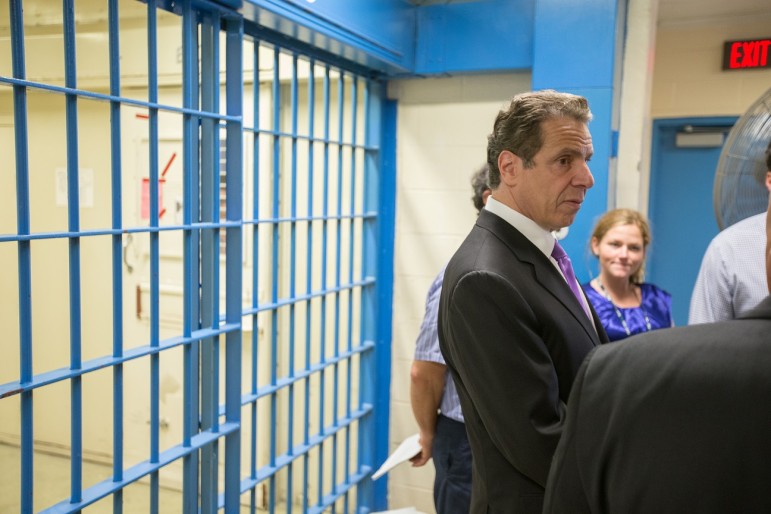
Office of the Governor
Gov. Cuomo on a recent prison tour. He supports raising the age.
I can’t recall a time when I visited a teenaged client on Rikers Island when she or he did not cry during our visit. I spoke with my clients through steel mesh in the legal visit area: I knew they were crying, but I could barely see their tears. My clients knew that the criminal justice system considered them disposable.
Teenagers charged with crimes are currently being treated as bargaining chips in a New York state legislative battle over raising the age of criminal responsibility. Democratic lawmakers want to raise the age from 16 to 18, but seem poised to make a compromise with Republican lawmakers who want to create a prison for this group of teenagers charged with felonies – where they would be segregated from adults in prison, but prosecuted as adults. This could have serious and damaging consequences for the safety and survival of these teenagers and does not promote public safety.
Like the financial ones, the social and emotional costs of housing teenagers in adult facilities are tragically high. Last week an 18-year-old teenager named Kenan Davis committed suicide on Rikers Island. Davis had requested mental health attention – but none was provided. His death comes in the wake of the suicide of Kalief Browder, a teenager from the Bronx who was incarcerated on Rikers Island without a trial for three years, starting when he was sixteen years old. The tragic deaths of these young men were a direct result of the traumatic experiences of their confinement.
Republican State Senators Martins and Gallivan have introduced a bill (S7740) proposing that a maximum-security prison, operated by the State’s Adult Department of Correctional Services, be established to house 16- and 17-year-olds. The senators suggest that this would be a way to “raise the age” of criminal responsibility, and keep “children” out of adult prisons. Another compromise that has been offered to satisfy Republican lawmakers who have opposed the state’s raise the age efforts is to build a “supermax”-style juvenile facility.
Proposing the construction of a prison for juveniles rather than allocating those funds for alternatives to incarceration, mental health and education programs is an outrage. Building a maximum-security juvenile facility rather than crafting thoughtful, far-reaching legislation that would allow young adults to be prosecuted in a manner consistent with their age and development is a dereliction of duty of the highest order.
The logic being promoted by Republican legislators is this: These teenagers are dangerous and juvenile facilities are not equipped to offer the sufficient punishment they require.
Lawmakers who believe that the imprisonment of teenagers will have a deterrent effect on crime are out of step with the evidence. Imprisonment does not prevent reoffending, and it may even have a criminogenic effect, meaning that imprisonment may actually cause crime. Additionally, harsher penalties and approaches to punishment do not deter crime.
So why are the lawmakers willing to embrace a compromise that actually jeopardizes public safety? It seems that that lawmakers believe that prisons create more jobs. But there again they are mistaken. Researchers have increasingly found that building prisons does not stimulate – and in fact may actually impede – employment growth in the communities where they are sited.
If any new secure facility is created, whether by the adult Department of Correctional Services or the state’s agency that operates juvenile facilities, history teaches us that these facilities will be filled with those who we consider disposable – young adults from New York City’s communities of color and from the very impoverished, rural, upstate communities that have prioritized prison building over social support.
How can this be happening in New York State at a time when the nation is focusing on the problems of mass incarceration? The demand to raise the age of criminal responsibility draws its support from research in developmental psychology, neurology, social science, and a growing tide of evidence against mass incarceration. The recent series of Supreme Court decisions have helped us to recognize that young adults are often impulsive and exercise poor judgment.
We must not lose sight of our moral purpose in raising the age of criminal responsibility: ending the harms of incarceration, recognizing the potential of young people, and instilling hope where there is none. Those who believe in rehabilitation understand that young adults are malleable, and that if we wish to reduce recidivism, the most effective way to achieve that goal is by funding mental health programs, public education, public health, and the creation of a social safety net that ensures that the basic human needs of our children and families are being met.
Alexandra Cox, Ph.D. is an Assistant Professor of Sociology at SUNY New Paltz, a former Soros Justice Fellow, and a mitigation specialist who has worked at the Neighborhood Defender Service of Harlem and the Drug Policy Alliance.








